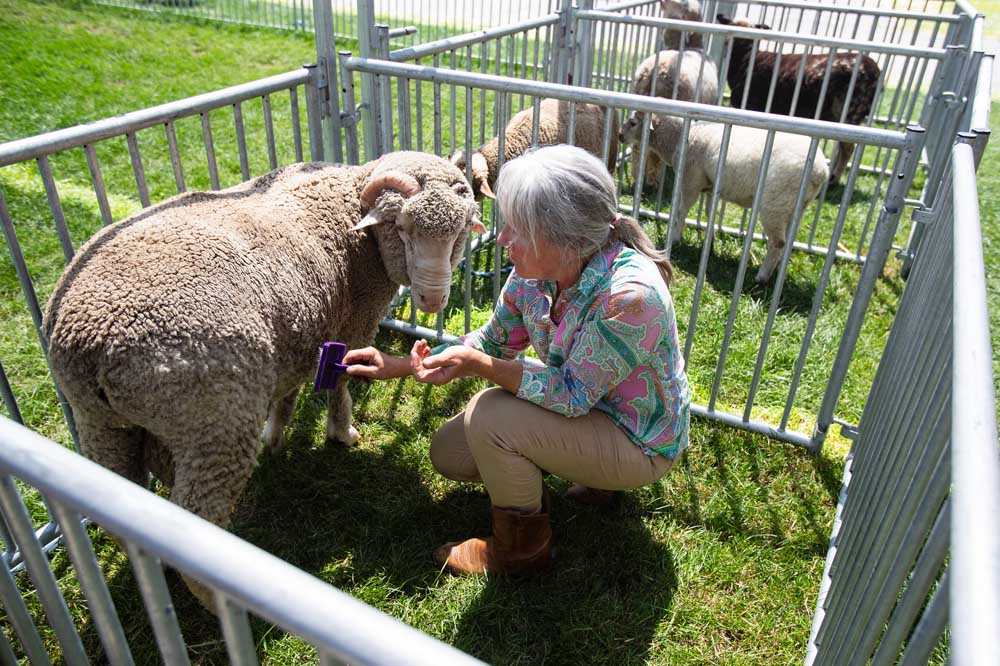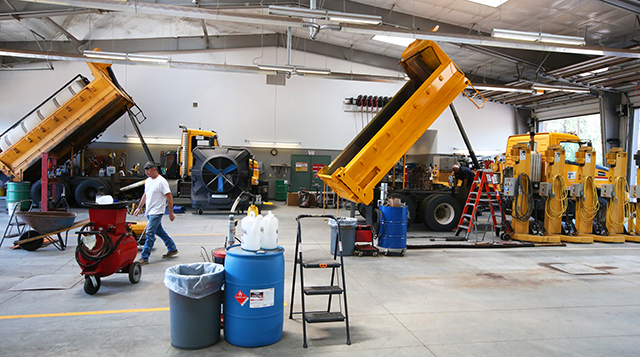Wooly wonders: Deschutes County Fair shows textile side of agriculture
Published 5:30 am Saturday, August 3, 2024

- Lynne Roy brushes one of her sheep before showing in the wool breeds categories at the Deschutes County Fair on Friday at the Deschutes County Fair & Expo Center in Redmond.
Inside the sheep barn at the Deschutes County Fair on Friday morning, Lynne Roy pressed her bare feet back-and-forth against a pair of wooden pedals, which spun a small wooden wheel, drawing a string of loose wool fibers into a tight spool.
“Mainly, it’s about the twist,” Roy said as she turned the blue wool, dyed with an indigo flower, between her fingers. “It’s about getting the twist into the fiber — not so much that it’s too twisty and too tight.”
Trending
This wool, along with the basket full of yarn next to her, all came from sheep she bred on the Roy-bobs’ Farm near Redmond, where she lives with her husband, Fred. In her youth she participated in 4-H programs at the Deschutes County Fair.
In the barn around her, sheep bred for meat far outnumber those bred for their coats. Still, some breeders of this versatile animal are placing an emphasis on its most sustainable resource: wool.
Oregon top producer
With about 165,000 sheep in the state, Oregon is a Top 10 state for production in the country, according to statistics presented in the fair’s sheep barn. A small minority — 17% — come from small producers with fewer than 100 sheep.
In some cases, Oregon’s wool has gone global, like the Shaniko Wool Co., which has furnished wool for the uniforms of Olympic athletes, including at the 2024 games in Paris.
The Roys have 28 sheep on their farm. They often sell unspun wool to small mills in the state, although those have declined in recent years, Fred Roy said.
Trending
Lynne Roy said wool sometimes gets a bad rap for being too itchy.
“Every type of wool has a use. It just might not be the one you want to wear against your skin,” she said.
Alternative uses include rugs, carpets, horse saddle stitching and, at least in the past, as material for sails on sailboats.
Carpets are often made from mohair — the type of fiber that comes from a goat. Mohair is sought after because of its durability, said Elizabeth Guerin, an avid spinner and weaver and the superintendent of the fair’s goat showings.
Though many goats wear long, spindly coats, only certain breeds grow the fiber soft enough to be wound into wool. Guerin said participants at this year’s fair experimented by crossbreeding a Nigerian goat, which is better for milk, with an Angora, prized for its coat. The result was a Nigora, which donned a short, messy coat of amber.
Wool production is a good example of a way producers can “think outside the box” to supplement their income, said Tammy Combs, director of the sheep barn at the Deschutes County Fair and former 4-H leader of 30 years.
Student producer
Only one 4-H student at this year’s fair was focused on fiber, rather than meat.
It’s Josylynn Terry’s eighth year in the 4-H program and her second sheep raised for wool. Josylynn, 14, also has Hampshire sheep, a meat breed, but much prefers working with her smaller, more docile Shetland sheep, which grow a wavy, elastic coat.
Shetlands are considered a triple-purpose breed, meaning they can be used for wool, meat and milk, Josylynn said.
“But they’re really prized for their wool,” she said.
Her flock of Shetlands grew this year, all fathered by her sheep named Bob Ross, a ram whose curly coat represents the painter’s famous large curly hairdo.
She’s already sold some of her sheep at the fair this year. But Josylynn hopes she can get back into wool production in the future, once she fixes up the wool spinner she has sitting at home.
In Central Oregon, the fiber arts community — people who produce and craft goods from natural materials — is healthy and continuing to grow, said Guerin. Groups like the High Desert Wool Growers and the Central Oregon Spinners and Weavers keep the old tradition alive in spite of new technologies, she said.
“It’s a small community, but it has a lot of resourceful, active individuals,” she said. “When you make your own things to wear, it puts deeper meaning into it.”
‘It’s changed the culture’ — students with special needs show sheep at Deschutes County Fair








